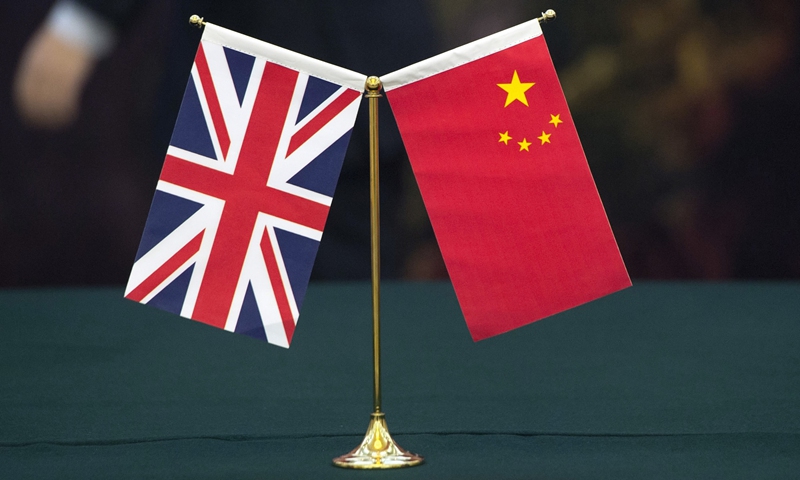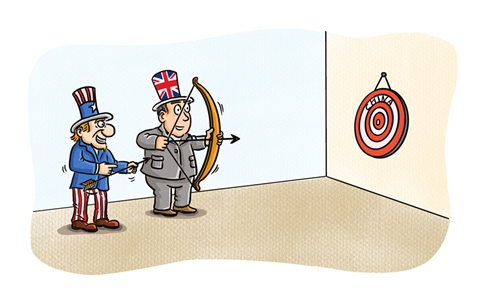UK’s ‘Chinese spy’ farce exposes undercurrents of anti-China force, chaotic views on Beijing

China UK Photo: VCG
The "Chinese spy" farce continues in the UK. Some MPs were "furious" and voiced concerns in a latest parliament debate over the allegations against a British parliamentary researcher who was reportedly arrested on the suspicion of spying for China, putting much more pressure on the Sunak administration that has been trying to seek a delicate balance regarding UK's China relations.
Some Chinese experts said on Tuesday that continuing hyping up those spy allegations reflected the existing undercurrents of anti-China force in the British politics, which aim to weaponize the allegations to sabotage the already-vulnerable bilateral relations. However, some cabinet officials resisting calls to label China as a threat to the UK showed that the British government holds ambivalent attitude toward China as developing a constructive economic and trade cooperation with the world's second-largest economy is a necessary means to solve its domestic economies woes, experts said.
Britain has been hoping to improve the UK-China relations, some media reported, and the country's foreign secretary James Cleverly made "the first tentative steps" to repair the ties as he visited Beijing in late August. But Chinese experts believe that the overall China-UK relations are not yet in a state of easement, and the latest political farce on "Chinese spy" only indicated Britain's internal chaotic views on China, which however, won't have a significant impact on the future development of the bilateral ties.
A tool of Tory strategy
London's Metropolitan Police revealed on Sunday two men had been arrested in March under the Official Secrets Act, Reuters said. The Sunday Times reported one of them was a parliamentary researcher, and on Monday it published a picture of a man it said was him.
However, lawyers for the man released a statement on his behalf without identifying him, denying the accusations. The statement said the man is "completely innocent," and emphasized that he spent his career to date "trying to educate others about the challenge and threats" presented by the Communist Party of China.
"By making the 'clarification,' the accused is trying to fasten himself to the anti-China agenda, in order to try and exonerate himself. This only shows the poisonous atmosphere of McCarthyism that has arisen in the UK in order to silence those advocating a balanced view on Beijing," a British expert who spoke on the condition of anonymity told the Global Times on Tuesday.
Such "clarification" has not put an end to this spy farce. Some British media such as BBC and the Financial Times continue using it as a trigger of reflection on the UK-China relations by raising questions such as "has the UK woken to the China spy challenge?" and "what spy saga reveals about the UK-China relations?"
In response to the "spying" claims, British Prime Minister Rishi Sunak said he is limited in what he can say specifically, "but I've been emphatically clear in our engagement with China that we will not accept any interference in our democracy and parliamentary system."
"One that can best unite the Conservative is targeting China," Li Guanjie, a research fellow from the Shanghai Academy of Global Governance and Area Studies, told the Global Times on Tuesday.
"Sunak has been hesitant to list China as a threat. I believe this approach aims to unite both the hawkish and dovish members within the party, but such tactic has not been effective," Li said.
While the hawkish voices within the Conservatives are dominant, there are still "many doves," the expert said. "Hence, there's a need for some to continue hyping on 'Chinese espionage' or other 'infiltration' allegation to make such topic a tool of Tory strategy," Li added.
Commenting on UK official criticizing China for disregarding human rights in Xinjiang and Hong Kong, and coercion and intimidation in the South China Sea, and alleging that China poses a "systemic challenge" to the UK and its values in a statement to the House of Commons on the so-called Chinese spies, the Chinese Embassy in the UK said on Tuesday that "These remarks by the UK side were a total misrepresentation of the facts and constituted blatant interference in China's internal affairs."
"We firmly oppose and strongly condemn it," the embassy said, urging the UK to stop seeking pretexts to advance its plots, stop interfering in China's internal affairs, and stop engaging in anti-China political manipulation.
On the "Chinese spy" allegations, there is very much media frenzy going on already, the anonymous British expert noted. "Sunak has proven himself to be a weak leader, whose position is already politically fragile amidst unpopularity, which makes him easily susceptible to weaponizing inflammatory and aggressive rhetoric on various issues to gain support."
Bilateral ties in focus
Following the spy allegations, some media pointed out that the accusations have been made at a time when the bilateral relations between the two countries have been already strained." Meanwhile, Conservatives are also divided on how to view and interact with China, which, some experts said, clearly showed the Sunak government is trying to balance its China policy.
Business Secretary Kemi Badenoch told the Sky News that China is not a foe, media reported on Monday, despite that Conservatives MPs urged the UK government to adopt a tougher stance against China.
"I do not believe this 'spy' hype-up will affect much the China-UK relations," Gao Jian, director of the Center for British Studies at Shanghai International Studies University, told the Global Times on Tuesday.
The overall momentum of bilateral relations is not based on individual will. The normalization of bilateral relations between China and the UK serves the common interests of both side, Gao said.
"In particular, the development of constructive economic and trade cooperation with China is a necessary means for the UK to solve its internal social issues and effectively safeguard its international interests," he said.
Over the past few years, the China-UK relations had moved from the "Golden Era" to competition and confrontation, and the UK has been enhancing its alignment with the US in Washington's strategy of containing China and the trying to demonstrate its presence in the Indo-Pacific region.
"Although the recent Cleverly's visit to China helped restarting bilateral communication and exchange mechanisms, the overall bilateral ties have not been in a state of easement," Li said, noting that how the bilateral relations would be adjusted in the future will wait until after next year's elections.
Despite that the overall political atmosphere in Britain has become tougher toward China, the economic relations between the two countries have been strengthened, Li said. "We should remain vigilant against those anti-China voices especially in trade and business sectors."


